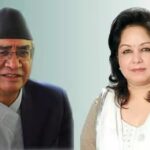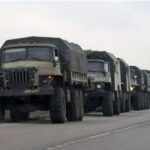By Our Political Analyst
Prime Minister Sher Bahadur Deuba, who considered the tabling of MCC in the parliament as his first success, is working to get the MCC passed. For this, the activism of the leaders of the Nepali Congress seems to have increased. Senior Congress leader Ram Chandra Poudel is concerned about passing the MCC and maintaining the alliance. He had held talks with CPN (MC) Chairman Pushpa Kamal Dahal on February 21. After the talks, Poudel arranged for Dahal to go to the PM’s residence.
In Baluwatar, Dahal had agreed with Prime Minister Deuba to table the MCC to the House on February 20. As per the agreement, it was the responsibility of Finance Minister Jarnadhan Sharma to table the MCC. As MCC is development assistance, all its work is being done by the Ministry of Finance. While presenting the document prepared by his own ministry to the parliament, Finance Minister Sharma pretended to be ill. Due to which, Prime Minister and Dahal finally entrusted this task to Gyanendra Bahadur Karki.
Prime Minister Deuba was not in the mood to meet Dahal after Dahal did not co-operate with the government during the MCC submission in the Parliament. Realizing this, Poudel created an atmosphere for Dahal to meet Prime Minister Deuba. Not only that, Poudel also showed a middle way to pass the MCC by maintaining the alliance. Due to which, Dahal had taken the matter further with Prime Minister Deuba presenting Poudel’s opinion.
Prime Minister Deuba has only one option to pass the MCC. Deuba, who has been blind on MCC lately, has totally forgotten other issues. The MCC has been his priority more than the government’s concern about who will stay or not. This indicates the pressure exerted on him by the US to pass the MCC.
Not only Prime Minister Deuba but also Nepali Congress General Secretary Gagan Kumar Thapa and other Congress leaders are looking for a way to pass the MCC. Thapa has already made public the idea that nothing will happen even if to leave the government, who are not in favor of MCC. This means that the Nepali Congress wants to go alone in the coming elections. Now the atmosphere is getting ready.
Trap set:
Four parties of the ruling coalition have fallen into the trap of MCC. After the letter written by CPN (MC) Chairman Dahal and Prime Minister Deuba to the MCC became public, Dahal’s double character was exposed. Leader Dahal had been increasing pressure on the Deuba by arguing to the Americans that the MCC could not table in the parliament because of Prime Minister Deuba. On the other hand, he had prepared Speaker Agni Prasad Sapkota as the goalkeeper to stop MCC.
After the MCC was tabled in the parliament, the Maoists are in a double crisis. Dahal is still playing the double role. He has already met Prime Minister Deuba and talked about the middle path. That is to say, the Maoists and the Unified Socialists will stand for no vote. One-third of the parliament passed the MCC with applause. That number is with the Nepali Congress in the current parliament.
Congress spokesperson Dr. Prakash Sharan Mahat has said that the idea of an alliance will be formed on the basis of how the other parties of the alliance are represented in the parliament on 24 February. Dr. Mahat’s view, close to Prime Minister Deuba, pointed that there is no justification for the alliance if it does not support the MCC. In other words, if the Congress does not get support for the MCC, it is not necessary for the Congress to remain in the alliance.
The Unified Socialists also have two sides in favor of the MCC. Some leaders, including senior leader Jhala Nath Khanal, are now seen opposing the MCC. Ministers in the government including Ram Kumari Jhakri are in favor of not leaving the government. They are ready to support the MCC to stay in government. Therefore, the meeting of the Socialist Standing Committee held on 19 February had decided to move the MCC forward.
The Maoists and the Socialists seem to have another stake in trying to stay in the government by standing in opposition to the MCC. With the same thought, Dahal had tried to create an atmosphere for talks with Deuba by holding talks with Poudel. The question of why did Dahal visit Deuba, the next day after MCC tabled, for talks without even waiting for a day or two is very important. The only reason behind this is to persuade Deuba to oppose the MCC and support the government.
MCC pass or fail:
At present, it is not sure whether MCC pass or fail. However, reading the face of Prime Minister Deuba, one can guess that MCC will pass. Nepal’s constitution does not say how to pass the MCC. It is a matter of natural resource allocation. This is not a treaty or agreement between the two countries. Therefore, when the MCC will present for approval in the Parliament Deuba is thinking of passing the MCC by the majority of those present.
The Maoists do not seem to be in a position to stay in no vote. In order to preserve the image of the Maoists as No MCC among the people, the Maoists should vote against the MCC in the parliament. During the conflict, the Maoists cadres were forced to attack the American project; as a result the United States has long listed them as a terrorist.
In internal discussions, Prime Minister Deuba has been saying that he will not share power with the parties opposing the MCC. Within the Nepali Congress, the opinion that power should not be shared with anti MCC parties is gaining strength. In such a situation, the MCC seems to be most hostile to the Maoists and the Unified Socialists.
The failure of the MCC means that parties other than the Congress vote against the MCC. In case of no-vote, the chances of passing the MCC are high. Prime Minister Deuba is thinking of concluding the issue of MCC by holding a discussion in the parliament from 24 February to 28 February.
UML’s demands should be addressed for MCC discussion. That means the speaker should resign. After the resignation of the speaker, the UML, who is now watching the MCC’s affair remaining alone, also gets involved in the MCC. In such a situation, UML does not have the moral strength to accept the presence of Madhav Nepal’s party. The UML should also decide whether to stand for or against the MCC.
Now the UML’s focus is on breaking the alliance. If the alliance broken, Prime Minister Deuba must seek a vote of confidence from parliament. In that case, Deuba has no choice but to dissolve the House of Representatives. UML Chairman KP Oli’s wish can also meet with Deuba in such condition. Due to which the election of the House of Representatives may be held along with the local election.
In case the UML removes the obstruction of the House of Representatives after the resignation of the Speaker, the UML must also vote for or against the MCC. In such a situation, the decision of the UML may be comfortable for the Maoists and the Socialists. On the other hand, if the UML favors the MCC, the Maoists and the Socialists will oppose it and accuse the UML of being an American agent.
The MCC is a strategy between the UML, the Maoists and the Socialists to win votes in the upcoming elections. Therefore, these three parties do not want to be in favor of MCC as much as possible. The three parties cannot stand against the MCC for long if the American pressure rises. Therefore, the CPN (MC) may force the UML, which is not in the whirlpool of MCC up to now, to resign from the Speaker.
The way ahead:
The impact of MCC on Nepalese politics will remain long whereever remaining on its for or against. The three parties do not seem to be freeing themselves from the shadow of MCC for long. Even if it is freed from the shadow of MCC, the three parties will keep the Congress in the midst of controversy.
The UML can only open up about the MCC in case the alliance breaks down. While the ruling coalition is in power, the UML escapes by saying that Nepali Congress have two-thirds majority. In order to be in favor of MCC, congress has to fulfill many demands of the UML. The role of the Congress is important in that.
Prime Minister Deuba’s idea of fulfilling his commitment to the MCC seems to have worked better than the Americans when it was tabled in Parliament. Therefore, Deuba is also honest on MCC. It is not easy for Deuba to reconcile as other parties have their own interests.
UML’s interest is the dissolution of the alliance. It is the resignation of the Speaker. The action must be taken against 14 leaders including Madhav Nepal.
The interests of the Maoist are a continuation of the alliance. There is coordination in all the three upcoming elections. The murder case against Speaker Sapkota must be back.
The interest of the Unified Socialists is to save the party. It is the participation in the government, to defeat the UML in the next election. That is for the electoral alliance.
America’s interest is to pass the MCC. It is to create an environment for the parties that do not support the MCC to close the doors of the parliament as much as possible in from the upcoming elections.
Deuba’s interest is to pass MCC, the continuity of the government. The aim is to keep the Congress in the government with the big parties from the upcoming election.




